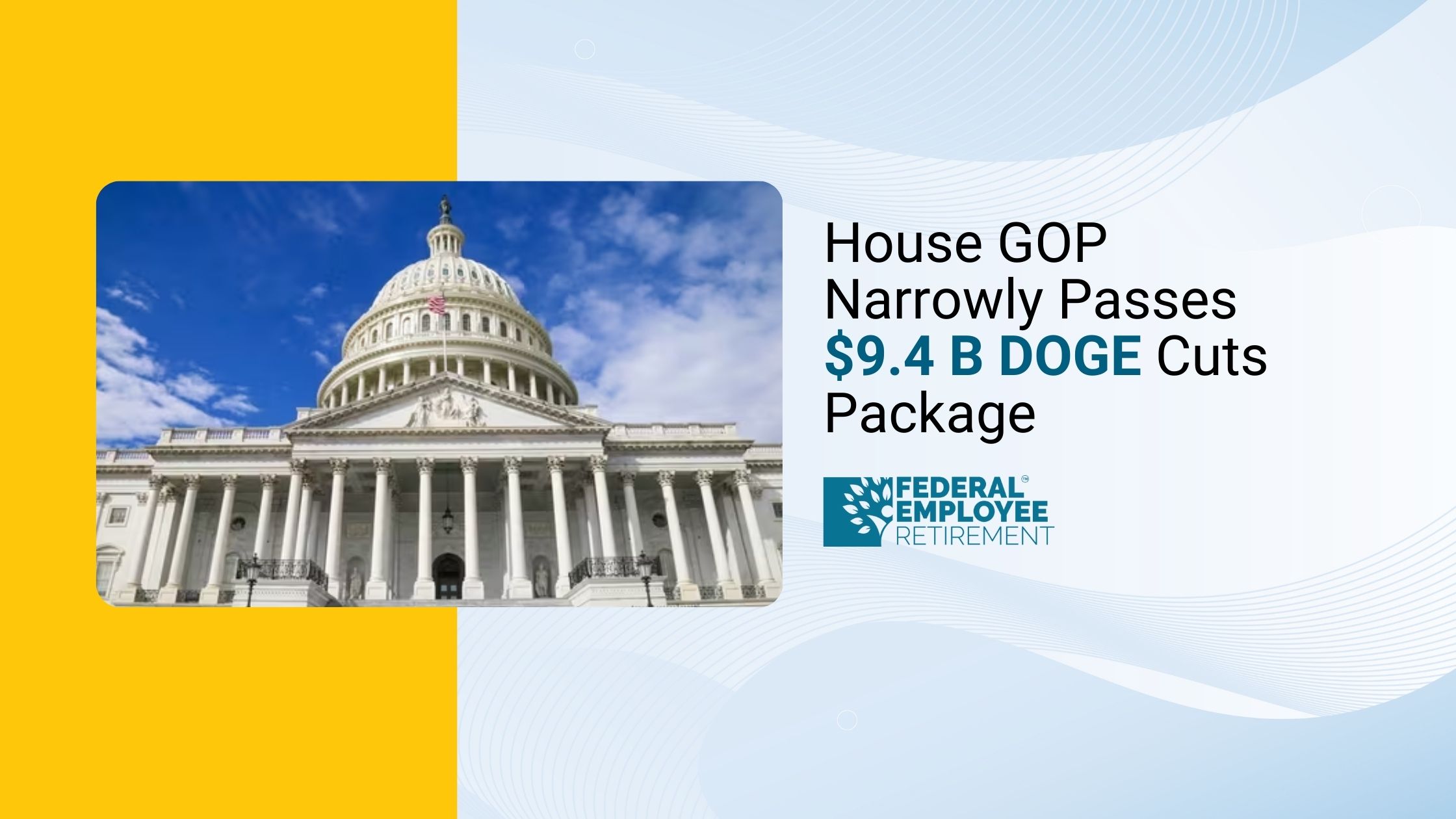You’re not alone; 4,359 federal employees booked their free review.

House GOP Narrowly Passes $9.4 B DOGE Cuts Package
When it comes to government spending, politics often revolves around who gets funded, who gets cut, and what message those choices send. On June 12, 2025, House Republicans passed a $9.4 billion rescissions package, popularly known as the first wave of DOGE cuts short for the Department of Government Efficiency. The vote was razor-thin, passing 214–212, with no Democrats in support and only a handful of Republicans holding the line after last-minute negotiations.
The debate surrounding this package reveals a great deal about how Washington is approaching fiscal responsibility, cultural issues, and America’s role abroad. Let’s unpack what happened, what’s inside these cuts, and what it could mean for the future.
What Are DOGE Cuts?
The Department of Government Efficiency (D
OGE) is an office tied to the Trump administration’s renewed push to slash what it considers “wasteful, unnecessary, and ideological” spending. Unlike sweeping budget battles that drag on for months, DOGE targets specific pots of money that have already been appropriated but not yet spent.
Congress can cancel these funds through a process called rescission. Under the 1974 Congressional Budget and Impoundment Control Act, rescissions are special because they require only a simple majority in the Senate no 60-vote filibuster threshold. That means Republicans see this as a nimble tool to trim spending without facing the usual roadblocks.
The Vote: A Narrow Win for House Republicans
The House vote was extremely close: 214 in favor, 212 against. Every Democrat voted “no,” framing the package as politically motivated and culturally divisive. On the Republican side, leadership had to work behind the scenes to lock in a few wavering members who were worried about how the cuts might affect local projects or foreign policy priorities.
In the end, the bill passed but barely. That narrow margin reveals just how fragile the coalition for spending cuts really is. Even within the GOP, there are differences between those who want sweeping reductions across the board and those who want to be more cautious.
What’s Being Cut?
The $9.4 billion in rescissions is a mix of domestic cultural programs and international funding streams. Here are the headline items:
Media and Cultural Programming
- A PBS documentary promoting reparations
- A PBS children’s show featuring drag queens
- A PBS-produced film celebrating a child’s gender transition
- An NPR feature about “queer animals”
- NPR programming discussing fat-phobia as racism and exploring animal pronoun usage
For Republicans backing the bill, these are examples of taxpayer money funding “radical social experiments” rather than neutral public programming. For Democrats, these cuts are a direct attack on free expression and representation.
International Programs and Foreign Aid
- $158 million — UN Peacekeeping Mission
- $83 million — UN Development Program
- $33 million — UN Population Fund
- $8 million — UN Human Rights Council
- $6 million — “Net Zero Cities” program in Mexico
- $6 million — Palestinian media and civic engagement programs
- $3 million — Iraqi Sesame Street project
Supporters argue that this trims America’s involvement in costly and often controversial foreign commitments. Critics counter that pulling back weakens U.S. influence and undermines global partnerships.
Why the Senate Matters
Passing the House was just the first hurdle. Because rescissions require only a simple majority in the Senate, Republicans see a path forward if they can hold their ranks together. But the math is tight. With Democrats controlling 50 seats and Republicans holding a slim edge, the outcome depends on a handful of moderates and independents.
If it passes the Senate, President Trump is expected to sign it immediately, making this the first official set of DOGE cuts. If it stalls, it becomes another symbol of partisan gridlock.
What This Means for Government Spending
On paper, $9.4 billion is a fraction of federal spending less than a rounding error in a multi-trillion-dollar budget. But symbolically, it carries weight:
- It sets a precedent. Once one rescission package is approved, others could follow. Republicans hope to use this as a recurring tool to push cuts without needing bipartisan compromise.
- It shifts priorities. By targeting cultural programming and international aid, the package reflects the GOP’s ideological stance on where taxpayer dollars should and should not go.
- It sharpens divides. The battle shows how even small amounts of funding can become flashpoints in America’s cultural and political wars.
The Bigger Picture: Culture, Debt, and Power
This fight is about more than just line items. It reflects three larger dynamics in U.S. politics today:
- Culture Wars in Budgeting: Republicans are increasingly framing budget debates in cultural terms asking why taxpayers should pay for programming they see as out of step with traditional values. Democrats, in turn, defend these programs as essential to representation and inclusivity.
- Debt and Fiscal Responsibility: With the national debt topping historic highs, conservatives are under pressure to show real cuts. The DOGE rescissions let them highlight action, even if the dollar amounts are relatively small.
- Global Role of the U.S.: Cutting UN funding and foreign aid projects raises questions about whether America is stepping back from its global commitments. Critics warn that China and other powers may fill the void.
A Small Cut with Big Implications
The House’s narrow approval of the $9.4 billion DOGE rescissions package is a reminder that sometimes the biggest political fights are not about the size of the cut, but about what it represents. To Republicans, it’s about waste, accountability, and cultural pushback. To Democrats, it’s about censorship, division, and isolationism.
As the bill moves to the Senate, the outcome is uncertain. But one thing is clear: debates over spending will increasingly double as debates over values. Whether you see this as fiscal discipline or ideological overreach likely depends on where you sit politically.
Either way, the DOGE cuts have ensured that America’s budget debates are about much more than dollars and cents they’re about identity, culture, and the country’s place in the world.


Get Updated
Subscribe to our weekly updates for the latest on retirement planning, federal benefits, exclusive webinars, and more!
Download Federal Retirement: Step-by-step Checklist
This comprehensive guide will help you understand your federal benefits, optimize your savings, and plan for a comfortable future.



.png)






.jpg)

